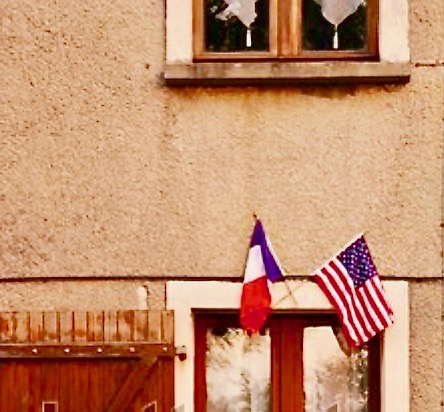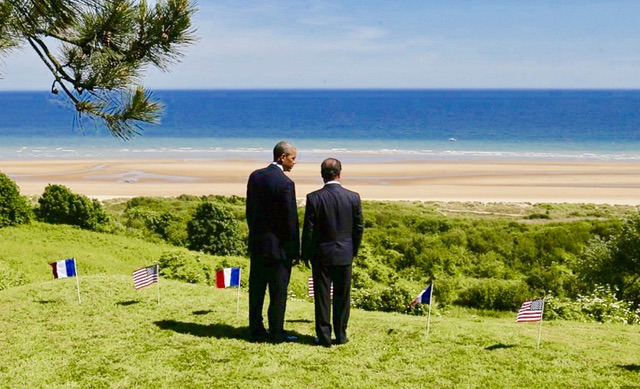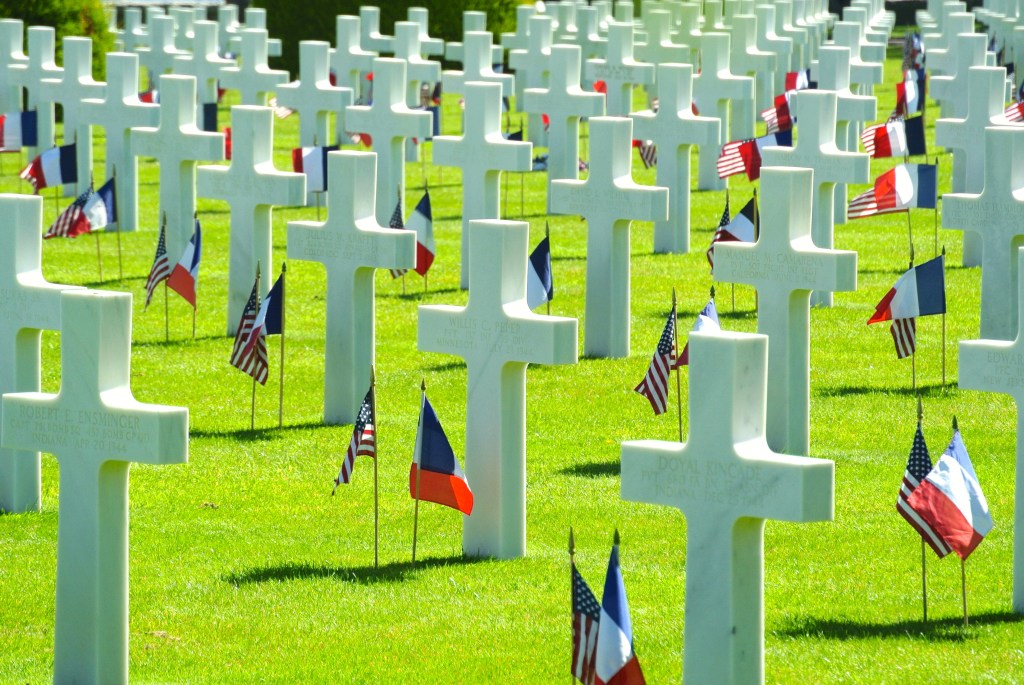Editor’s Note: While we were living in France, my husband was invited by the American Embassy in 2014 to take a group of students from the American School in Paris to a commemorative ceremony overlooking Omaha Beach at the Normandy American Cemetery and Memorial. It was the 70thanniversary of the D-Day landings on June 6, 1944. The presidents of France and the United States spoke. American veterans of that fateful day were present. It was a time to reflect on remarkable courage and leadership–with freedom as the outcome. I wrote about that here: The Unexpected in Normandy
Five years later, as the 75th D-Day anniversary approaches, we now live in the U.S. and find ourselves thinking about our country’s role in today’s world. I asked my husband to be a guest writer and offer his perspective on keeping the spirit of D-Day alive. What follows are his remembrance and thoughts about an historic event and the hope that the metaphoric message of D-Day will live on throughout all generations. Thank you, Mark.

There’s a graveyard in northern France where all the dead boys from D-Day are buried. The white crosses reach from one horizon to the other. I remember looking it over and thinking it was a forest of graves. But the rows were like this, dizzying, diagonal, perfectly straight, so after all it wasn’t a forest but an orchard of graves. –Barbara Kingsolver
Second Lieutenant Richard Winters parachuted into D-Day in the early hours of June 6, 1944, separated from his weapon as he jumped, landing miles away from the rest of his Easy Company 506 Parachute Regiment. A soldier from another company, who came down near Winters, asked if they were lost. Lieutenant Winter’s response? “We’re not lost private, we’re in Normandy.” Operation Overlord had begun at 1:30AM on a pitch-dark morning.
In all, about 75,000 Americans parachuted behind the lines or disembarked from an armada of boats onto Utah and Omaha beaches that first day. Casualties were over 10,000. With unimaginable sacrifice and courage, so began the liberation of France and, once the breakout unfolded beyond Normandy, the fall of German Fascism.
Consider that seventy-five years ago the youth of America with their lives out in front of them came ashore, under withering fire, based on a premise of arriving into a country not their own, fighting to liberate a people they did not know, and becoming one with the human race in a fight against Nazism. Not words but actions to preserve democratic ideals of self-government, liberty, equality and human freedoms. “America First”–no. American leadership–yes. In the words of Harry S. Truman, “America was not built on fear. America was built on courage, on imagination and an unbeatable determination to do the job at hand.”
But on June 6, 1944 there was terror amid bloodshed and dying young men crying out for their mothers. It was a time when America did the most important thing on earth by letting besieged nations know they were not alone. It was American power with characteristic capacity for good.
Today if you fly into Paris, rent a car, and drive into the Normandy countryside you will see two flags adorning doorways of farmhouses and homes–the French tri-color and the American stars and stripes. Young school children still tend the graves in allied cemeteries across France.

Five years ago, I took students to Colleville-sur-Mer, in Normandy, France, to participate in the ceremony of the 70thanniversary of the D-Day landings. That year’s commemoration brought together then U.S. President Barack Obama and French President François Hollande at the Normandy American Cemetery. They spoke of what love means after all: sacrifice and selflessness. Standing on this ground, absorbing the meaning of their speeches, made me weep. I wanted every child from now to eternity to understand what happened in Normandy.

President Obama observed that, “If prayer were made of sound, the skies over England that night would have deafened the world. And in the pre-dawn hours, planes rumbled down runways; gliders and paratroopers slipped through the sky; giant screws began to turn on an armada that looked like more ships than sea. And more than 150,000 souls set off towards this tiny sliver of sand upon which hung more than the fate of a war, but rather the course of human history.”
Then our president said, “But in the annals of history, the world had never seen anything like it. And when the war was won, we claimed no spoils of victory — we helped Europe rebuild. We claimed no land other than the earth where we buried those who gave their lives under our flag and where we station those who still serve under it. But America’s claim — our commitment — to liberty, our claim to equality, our claim to freedom and to the inherent dignity of every human being — that claim is written in the blood on these beaches, and it will endure for eternity.”
How important it was for our students, surrounded by 9388 gravestones, to hear about America’s (and our allies) sacrifice beyond borders.

President Hollande described the reality of that day in 1944, “Seventy years ago to the day, right here, opposite this beach, this beautiful beach on the Riva Bella, thousands of young soldiers jumped into the water under a torrent of gunfire and ran toward the German defenses. They were 20 years old, give or take a few years, and at that moment, who could say that 20 was the best age in life? For them, 20 was the age of duty, it was the age of commitment, it was the age of sacrifice. They were cold; they were afraid. On that June 6th the air, so pure today, was thick with the smoke of the first clashes, and riven by the din of explosions. The calm water we see today was striped with foam from the landing craft and red with the blood of the first combatants. What were those 20-year-olds thinking in the face of this terror? They must have been thinking of their beloved mothers, their fathers so worried, their loved ones so far away, their childhoods so recent, and their lives so short, lives whose horizons were blotted out by the war.”
“And yet those young men, amid that hell of fire and steel, didn’t hesitate for one second. They advanced, advanced across the soil of France, braving the bullets and shells; they advanced, risking their lives to defeat a diabolical enemy; they advanced to defend a noble cause; they advanced, yes, and went on advancing, to free us, to liberate us at last.”
The French president reminded us about the character of America and our country’s leadership, “But the soldiers who came from the sea had achieved the essential thing. The essential thing was to set foot on French soil, and on 6 June they had begun to liberate France. And as the sun set on the Longest Day, a radiant beam of hope rose over subservient Europe. On these Normandy beaches, the memory lingers of a bitter, uncertain, decisive confrontation. On these peaceful Normandy beaches, the souls of the fighters who gave their lives to save Europe live on. On these tranquil beaches, whatever the weather, whatever the climate of the seasons, a single wind blows, the wind of freedom. It still blows today.”

On that beautiful spring day in the “orchard of gravestones”, Normandy American Cemetery, all of us attending the 70thanniversary recognized that freedom is fragile and that we must stand together as nations. Hollande continued, “I’ve talked about courage – the courage of the soldiers, the courage of the resistance fighters, the courage of people at the time; courage in wartime. But courage in peacetime is just as essential and necessary. What motivated the soldiers who landed here 70 years ago? Their patriotic duty? Yes, no doubt. But also an idea, an idea they all shared, whatever their nationality: by setting foot here, on these beaches, they were carrying a dream, a dream which seemed impossible in 1944; a dream born out of the depths of despair, a dream which enlightened their conscience. What was this dream? It was the promise of a world free from tyranny and war.”
Speaking directly to President Obama, François Hollande said, “Mr. President, the French people recognize an indefatigable energy in America, an ability to innovate, create, invent and carry the dream of success. But what they admire the most in the American people – because they themselves are its most ardent champions – is their love of freedom. And my compatriots know that, when the critical moment comes, when our principles are in danger, France and the United States always come together, as in that terrible summer of 1944 on the beaches of Normandy and on the beaches of Provence.”

How is it possible to hear the French president’s words about the spirit and character of America and not feel proud, and today wonder how we would ever compromise this legacy under the moniker of “America First?” What is the message we send our youth about the principles of democracy and friendship between nations being worth courage and sacrifice? The story of June 6, 1944 must live in the hearts of today’s and future generations too.
As the 75thanniversary of the Normandy landings approaches, with many fewer World War II veterans alive, is there not still a message about America’s leadership overseas? To honor those young, forever young soldiers who died for our freedom on foreign soil that day in 1944, what decisions will we make about our world? Is it going to be totalitarianism or will democracies prevail? Will the current “America First” idea, or runaway nationalism, diminish the message of Normandy? History tells a different story. America was not so constructed. We lead with generosity.
Today, American leadership around the world is perhaps in doubt, especially when leaders of other countries are asked. We appear to be an uncertain friend. Our moral compass is without a true north.
Maybe the Longest Day, seventy-five years later can serve as a reminder that if there is an “America First” concept, it is our willingness to step into the breach–to advance values born out of the Constitution and with our allies in common purpose to preserve freedom around the world.
It was William Blake who said, “The most sublime act is to set another before you.” We remember June 6, 1944 by defining a hero as someone who has given his or her life to something bigger than oneself. Such thinking might well apply to individuals and nations alike. A life message to all children–we want them to know and to care.
Let “America First” mean finding our way with confidence and courage to confirm our nation’s place as an agent for good in the world. On this principle, we need to stand rock solid. Think of two soldiers finding their way on the darkest of nights, having been dropped from the sky, not knowing what was ahead, but optimistic–where the metaphor of our time lies in the hopeful words of Dick Winters, “We’re not lost private, we’re in Normandy.”


Thanks for putting it in such fine words for us all to read and share. Message received. Now we venture forward to let it be heard by the masses. Let it be KNOWN.
LikeLike
Well said. Thank you Mark.
LikeLike
This has me moved to tears. The story gives me hope and inspires me to stick to “True North” values, especially when facing challenges requiring sacrifice. It could not come at a more important time. Thank you Wendy for inviting Mark to share this poignant piece. Thank you Mark for reflections on leadership.
LikeLike
Thank you for sharing what was clearly an inspiring experience, but also a sobering one. We are facing the enemy in the form of authoritarianism, racism, misogyny and greed. A call to arms if ever there was one. Onward.
LikeLike
Bravo Mark and Wen!
LikeLike
Important day! Thanks for the reminder, Wendy!
LikeLike
So well written! Thank you for reminding all of us our responsibility to see that no one ever forgets.
LikeLike
Very moving piece, Mark. Thank you.
LikeLike
Thanks for this insightful piece!
LikeLike
Thank you both. Finely-tuned prose that speaks eloquently of two realities: one of America’s saddest, yet finest hours seventy-five years ago, contrasted with the jeopardy of that spirit in the hands of our current national leadership.
LikeLike